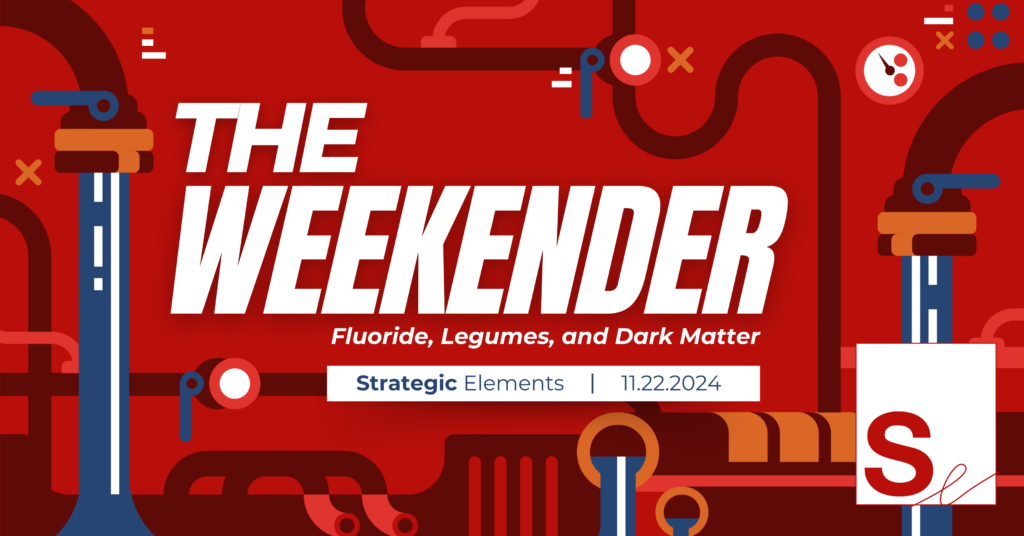DATA POINTS
- 3: The number of “Doomsday Fish” to wash up on California‘s shoreline this year; said to be a sign of bad news
- 22: The number of terms served by newly re-elected Ohio Congresswoman Marcy Kaptur, the longest-serving U.S. House member
- 37%: The percentage of Americans who say they regularly get their news from influencers on social media
- 50.8%: The percentage of California voters who voted against raising the minimum wage; the first time in state history that voters rejected a statewide minimum wage increase
- 80 M: The number of people expected to travel for Thanksgiving this year; 2 million more than last year
- 108 M: The number of viewers that watched the Jake Paul vs. Mike Tyson boxing match, the most-streamed sporting event ever
The Power of the Eraser
Republicans are walking into the 119th Congress with a legislative trifecta – and they are going to use it before they lose it. On Tuesday, outgoing Senate Majority Leader Mitch McConnell said Republicans intend to use the Congressional Review Act (CRA) to end some of President Biden’s administrative accomplishments in the new year. The CRA is a tool that Congress wields to overturn rules issued by federal agencies, including the EPA, DOE, DOJ, and the Treasury.
The law, which passed in 1996, had only been used once prior to 2017. The first Trump administration used it to overturn 16 rules issued at the end of the Obama Administration. There’s a catch, however; after a federal agency issues a final rule and submits it to Congress, Members have only 60 days (excluding recess) to disapprove it. This means that Republicans will need to act quickly if they intend to block lame-duck initiatives the Biden Administration is pushing through their final days.
The CRA requires a simple majority in the House and Senate, which shouldn’t be a heavy lift for Republicans despite razor-thin margins in the House. It also requires a Presidential signature, so the action will begin on Monday, January 20, when President-elect Trump is sworn into office.
Aside from tackling Biden’s activity, Republicans will go to work on their 100-day legislative priorities (so long as Speaker Mike Johnson and Majority Leader John Thune can effectively keep their Members voting in unison). These priorities include extending Trump’s 2017 Tax Cuts and Jobs Act, funding border security measures, repealing as much of the Inflation Reduction Act as desired, and expanding school choice, allowing students to use public funds for private or alternative schools.
 For Fluoride’s Sake
For Fluoride’s Sake
Robert F. Kennedy, Jr. has been tapped as Donald Trump’s next leader of the Department of Health and Human Services has big plans to “Make America Healthy Again.” Reversing the chronic disease epidemic, attacking the food industry, and going after pharmaceutical manufacturers are all on his agenda. He has been a lifelong opponent of ultra-processed foods, poor nutrition, food additives, pesticides, and toxic chemicals and will likely aim to address obesity within the agency as well. His first fight is shaping up to be a debate that’s been on a low simmer for decades: fluoride in drinking water.
Most Americans have fluoride in their drinking water to hinder tooth decay and cavities since the mineral counteracts the natural bacteria in our mouths that not only work to digest food but also degrade teeth. We’ve known since 1901 that fluoride supports oral health by strengthening enamel, but RFK (and counties across the country) are questioning if it brings adverse effects to our bodies as a whole. An August report from the federal National Toxicology Program stated that while water fluoridation has been exceptionally effective at reducing tooth degradation, pregnant women and children may be exposed to too much of it in their water supply, potentially leading to impacts on neurodevelopment and cognition. The report also noted, however, that there was insufficient data to determine if kids’ IQs are being impacted.
It’s an issue that has been left at county and state discretion for decades. Communities in Oregon, the third-least-fluoridated state, have overwhelmingly voted against putting fluoride in their water. While the Trump Administration can encourage local municipalities to remove the mineral from their water supply, they will likely be unable to attack the issue on a national scale.
Read More at The Washington Post
Beans No Longer Has-Beens 
Have you been eating beans? If not, you should probably make a trip to your local grocery store. Beans are becoming the new poster child of nutritionists nationwide. High in protein and fiber while low in fat, beans host a myriad of benefits. They can lower blood pressure and cholesterol, improve your gut biome, and may lower the risk of cardiovascular disease, obesity, and colon cancer. With their high levels of iron, potassium, and folate, beans are winning the gold medal in the nutrient powerhouse competition.
Beans are exceptionally cheap and remarkably versatile in any dish. Put them in soups, salads, or meat sauces, eat them next to your morning eggs, or make some chili. For new travelers on the bean train – start slowly and drink lots of water since they are dubbed the “musical fruit” for good reason. The more consistently you eat them, the more acclimated your body will become – and the more your body will thank you.
Read more at The Wall Street Journal
Dark Energy is Slightly Brighter
If you look into the night sky, you’d be forgiven for thinking that galaxies, stars, planets, and even black holes are the main characters of the interstellar storyline. Astronomers have known for decades that there is far, far more under the surface than what our best technology can see. All the ordinary matter and energy like stars, planets, asteroids, and us, only make up 5% of the universe. The remaining 95% is what is lovingly called dark energy and dark matter, each found to comprise 69% and 26% of the universe, respectively. So, what is this stuff? In short, we have no idea. That’s where this matter and energy earn the “dark” tagline. We can, however, see the massive impact dark matter and energy have on the universe. Like a galactic graffiti artist, we don’t know who this is or why they’re doing it, but they leave traces for us to find and study.
Earlier this year, an international research collaboration made yet another breakthrough in dark energy. They found that dark energy is not a constant force – it is changing or weakening over time. If their findings can be corroborated, it would turn modern understanding of the universe on its head.
This may not impact our daily lives, but it has profound implications for how we see ourselves as a living component of this large dark web. Scientists are trying to find out how the universe ends. Will there be a Big Rip (where dark energy wins, sending everything infinitely further away from itself) or the Big Crunch (where dark matter wins, sending everything colliding back into itself)? Or, if Einstein’s Model is correct, dark energy and dark matter will play nice and balance themselves for a long, healthy lifespan in the cosmos.
Read More at The Associated Press
GOP Winning the Social Media Fight
Conservatives, who years ago felt their voices were being suppressed online, took that fight personally. Today, the Right seems to be winning the social media wars. Truth Social, Gab, Parler, and more have grown increasingly popular as right-wing social sites to discuss politics. Avid Trump Supporter Elon Musk owns X, which worked in Trump’s favor this past election cycle. Meta’s Instagram, Threads, and Facebook have all moved away from the tried-and-true approach of promoting political content. TikTok is for memes, jokes, and content creators.
Some Democrats are feeling left out of the social media conversation.
After January 6, 2021, Facebook and Twitter gave the Trump-sphere the boot (including the President-elect himself). This was the unintended catalyst for the shift. Since Team Trump wasn’t allowed to participate in mainstream social networks, they simply made their own. Now, Democrats feel the lack of a central location to rally their base, workshop ideas, meet like-minded voters, or post the embittered “Bernie Beats Trump 2016” taglines. Both parties need to sell their agendas, and Republicans seem to have control of the marketplaces.
Read More at the New York Times
See you next week!
Be sure to follow us on Facebook, Twitter, and LinkedIn for more news and industry updates. To receive a copy of The Weekender in your inbox, sign up here.










